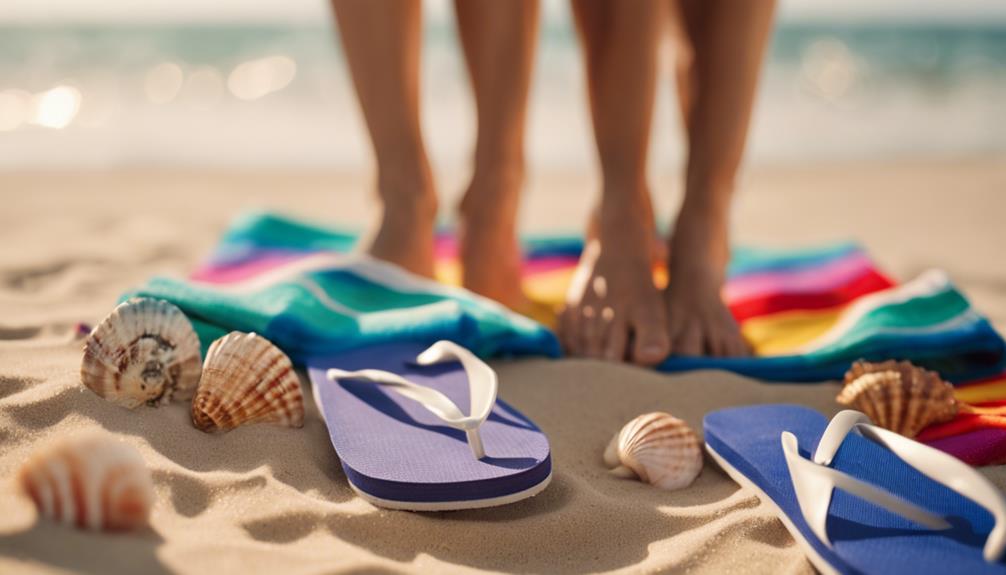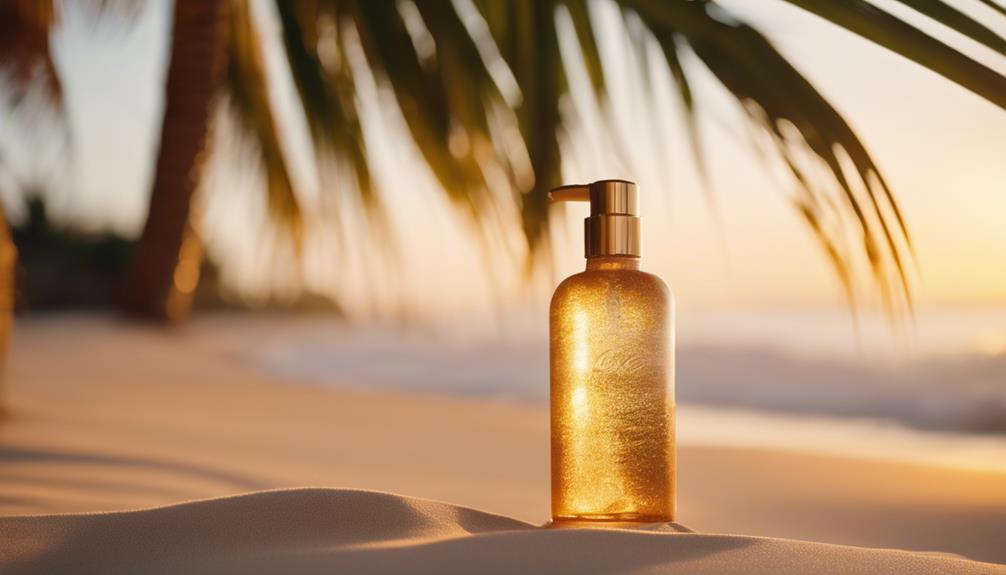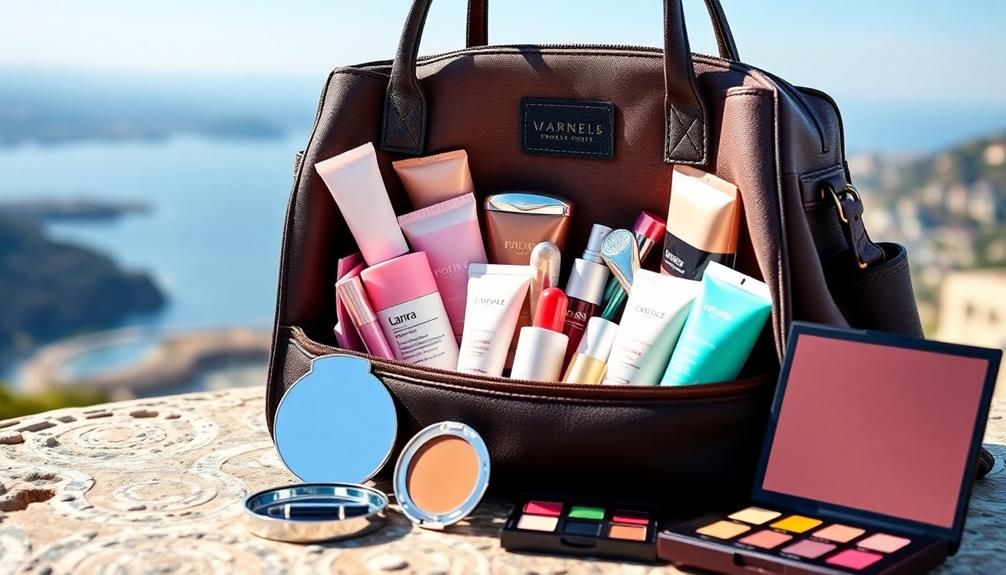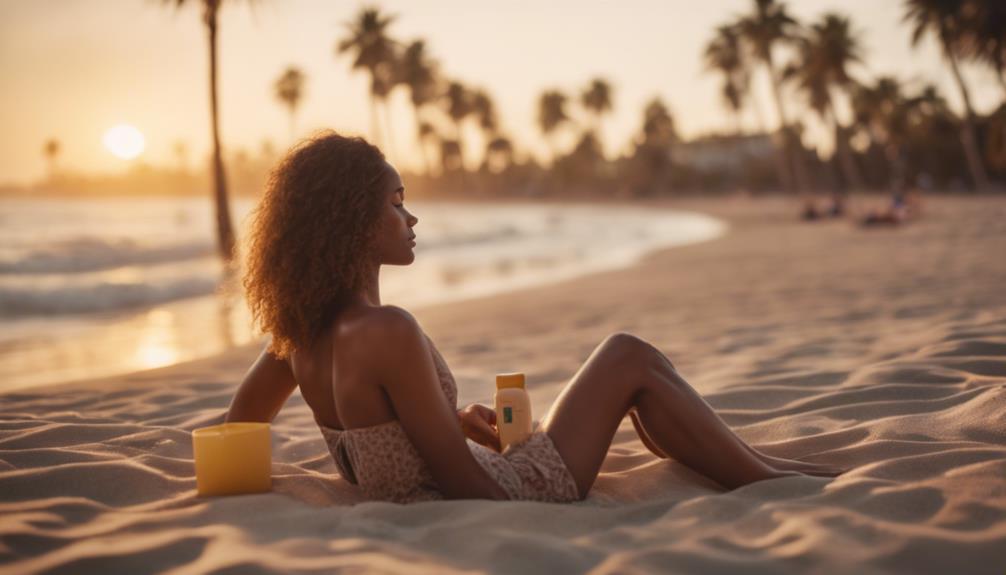Tanning might give you that coveted glow, but it can also turn your skin into an itchy nightmare. This irritation often comes from UV rays, drying out your skin, or the ingredients in tanning lotions that simply don't play nice. If you start seeing rashes or bumps, your skin's waving a red flag! To keep the itch at bay, remember to hydrate like it's your job, take it slow with tanning sessions, and moisturize like you mean it. And hey, if the itching doesn't chill out, it might be a good idea to consult a pro—there's a lot more to uncover!
Key Takeaways
- UV exposure and tanning lotions can irritate the skin, leading to itchiness and discomfort.
- Skin reactions like rashes, raised bumps, and redness indicate overexposure to UV rays.
- Stay hydrated and moisturize regularly to combat dry, itchy skin during tanning.
- Use gentle, hypoallergenic products to minimize irritation and monitor your skin's reactions.
Causes of Itchiness
Itchy skin after tanning often results from UV exposure that irritates your skin and depletes its moisture. Imagine your skin like a sponge—when it's dry, it tends to get cranky!
That sun or tanning lamp zaps away hydration faster than you can say 'sunscreen.' Plus, if you're using tanning lotions, those fragrances and preservatives mightn't always play nice with your skin, leading to that itchy feeling. It's like inviting a party crasher who just won't leave!
And let's not forget about overexposure—too much UV can throw your skin into a fit, resulting in rashes and irritation.
Skin Reactions to Tanning

Tanning can trigger various skin reactions, including rashes and inflammation, which indicate your skin's struggle to cope with UV exposure. You might notice raised bumps or redness, almost like your skin's way of waving a little white flag. It's a sign that it's had enough of those UV rays! This inflammation and rash is your body’s way of protecting itself from further damage. In fact, these reactions are part of the reason why tanning can make you paler in the long run. The skin’s response to UV exposure includes producing more melanin, which can lead to a darker skin tone temporarily. However, repeated exposure can actually damage the skin’s ability to produce melanin, leading to paler skin over time.
Heat rash can sneak in too, thanks to clogged sweat glands—think of it as your skin saying, “Help, I'm overheating!”
Keeping an eye on these reactions post-tanning is essential. Ignoring them? That's like ignoring a smoke alarm! Your skin deserves a little TLC, so when you spot those pesky signs, don't just shrug them off. Remember, it's your body's way of asking for a break and some love!
Prevention and Care Tips

To keep your skin happy and prevent reactions like rashes or irritation, gradually increase your tanning session duration and prioritize hydration. Think of your skin like a sponge; it needs moisture to stay soft and bouncy! Always moisturize before and after tanning, and opt for hypoallergenic products to dodge those pesky allergic reactions.
Here's a quick reference to help you stay on track:
| Tip | Why It Matters | Action |
|---|---|---|
| Gradual Tanning Sessions | Builds tolerance | Start with shorter sessions |
| Stay Hydrated | Prevents dryness | Drink plenty of water |
| Use Gentle Products | Reduces irritation | Choose hypoallergenic lotions |
| Take Breaks | Avoids overexposure | Listen to your skin |
| Moisturize Regularly | Locks in moisture | Apply before and after tanning |
Your skin will thank you!
Soothing Itchy Skin

Relief for your irritated skin can be found with soothing remedies like aloe vera and fragrance-free moisturizers. Seriously, these guys are like the superheroes of post-tan care!
Aloe vera cools and hydrates, while moisturizers lock in that precious moisture your skin craves. You might also want to try products with hyaluronic acid or oatmeal for extra comfort.
And hey, when you hop in the shower, stick to cool water—hot showers can just make everything worse. If you're feeling fancy, chill your moisturizer in the fridge for a revitalizing treat!
Your skin will thank you, and you'll feel like you're giving it a mini spa day. Trust me, treating your skin right makes all the difference!
When to See a Doctor

If persistent itching or rashes last several days, it's time to consult a dermatologist. Think of your skin like a delicate fabric; if it starts ripping, don't just ignore it!
Excessive scratching can lead to infections, and that's an unwanted party crasher. If you notice discolored pus or even a fever, don't wait—those are your skin's SOS signals.
A dermatologist can help calm the chaos, often prescribing antihistamines or hydrocortisone cream to ease your discomfort. Plus, if you've got a family history of skin cancer, it's especially important to get professional advice.
Your skin deserves the best care, so don't hesitate to reach out when things get itchy! Trust me, your skin will thank you later!
Frequently Asked Questions
Can Certain Skin Types Be More Prone to Tanning-Related Itchiness?
Yes, certain skin types are more prone to tanning-related itchiness. If you have sensitive or dry skin, you're likely to experience irritation more easily. Moisturizing and choosing the right products can help alleviate discomfort.
How Can Diet Impact Skin Reactions to Tanning?
While a healthy diet nourishes your skin, poor food choices can lead to increased inflammation and sensitivity. Balancing antioxidants and hydration in your meals helps your skin better withstand the effects of tanning and UV exposure.
Are There Specific Medications That Increase Sensitivity to UV Exposure?
Certain medications, like antibiotics and some antihistamines, can increase your sensitivity to UV exposure. If you're on such medications, it's wise to consult your doctor before tanning to avoid potential skin reactions and discomfort.
Can Indoor Tanning Equipment Vary in Causing Skin Irritation?
When it comes to indoor tanning equipment, you'll find variations that can lead to skin irritation. Some devices might be gentler, while others could wreak havoc on your skin, so choose wisely and pay attention.
What Role Does Hydration Play in Tanning and Skin Health?
Hydration's essential for skin health during tanning. It keeps your skin moisturized, reducing irritation and dryness. Drinking water and using effective moisturizers before and after tanning helps maintain your skin's elasticity and overall appearance.
Conclusion
So, next time you’re basking in the sun or hitting the tanning bed, remember to keep an eye on your skin! Not only can overexposure to UV rays lead to skin damage and premature aging, but it can also increase your risk of developing skin cancer. To protect your skin, always use sunscreen with at least SPF 30, wear protective clothing, and seek shade during peak sun hours. And don’t forget to stay hydrated and say goodbye to oily skin by using oil-free moisturizers and cleansers. Your skin will thank you in the long run!
Itchy skin can be a real buzzkill, right? By knowing the causes and following some simple tips, you can enjoy that golden glow without the irritation.
After all, who wants to scratch like a dog with fleas?
Stay informed, take care of your skin, and you'll be on your way to a fabulous tan without the hassle!









